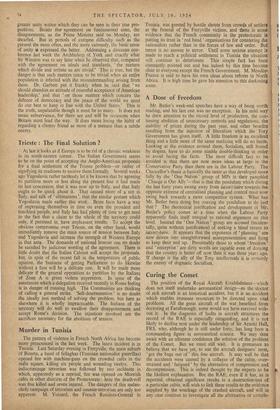A Dose of Freedom
Mr. Butler's week-end speeches have a way of being worth reading, and his last one was no exception. In his mild way he drew attention to the record level of production, the con- tinuing abolition of unnecessary controls and regulations, the stability of prices during the past year, and other benefits resulting from the injection of liberalism which the Tory Government has given itself. A little freedom is an excellent thing and a little more of the same medicine will do no harm. Looking at the evidence around them, Socialists, still bound by dogma, have to do some nimble double-thinking in order to avoid facing the facts. The most difficult fact to bo avoided is that there are now more ideas at large in the Conservative Party than there are in the Labour Party. Tho Chancellor's thesis ;s basically the same as that developed more fully by the `One Nation' group of MPs in their pamphlet ' Change is Our Ally '—that is that the pendulum which during the last forty years swung away from laissez-faire towards the opposite extreme of centralised planning and control must now swing back towards a more competitive system: What has Mr. Butler been doing but coaxing the pendulum to do just that ? The theoretical justification and development of Mr. Butler's policy comes at a time when the Labour Party apparently finds itself unequal to rational argument on this level. Instead the One Nation' group are accused (inciden- tally, quite without justification) of seeking a blind return to laissez-faire. It appears that the exponents of planning' are now driven into straightforward misrepresentation and lying to keep their end up. Presumably those to whoni freedom' and enterprise' are dirty words are capable even of denying that the country is better off now than it was three year.; ago. If change is the ally of the Tory intellectuals it is certainly the enemy of dogmatic Socialism,


































 Previous page
Previous page